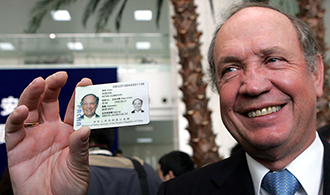Diaoyu calls for strong steps
By Liu Qiang (China Daily) Updated: 2012-09-18 08:09
Despite China's strong opposition and warnings, the Japanese government went ahead with its plan to "purchase" the Diaoyu Islands from its "private owner". The tension between China and Japan over the Diaoyu Islands is very high and bound to make the future of Sino-Japanese ties more uncertain.
Japan intensified the Diaoyu Islands dispute because its long-term expansionary designs has encountered a new international strategic environment. This expansionary design is rooted in the Japanese nation's strong belief in its mightier-than-the-rest thinking. That is to say the "purchase" of the Diaoyu Islands is not just a farce orchestrated by Japanese right-wing forces, but an application of Japan's expansionary strategy.
Since the Meiji Restoration, which restored imperial rule in Japan in 1868, Japanese leaders have been pursuing expansion by launching wars to grab other countries' territories and resources. China was a victim of Japanese aggression in the late 19th century and the 1930s and 1940s until Japan surrendered unconditionally in World War II.
After the end of World War II, Japan was forbidden by international treaties to rebuild its military but it has not changed its expansionary design. There is no doubt that Japan's disputes with neighboring countries are the result of its expansionary policies and that it used the Cold War, when China and the US were at loggerheads, to control China's Diaoyu Islands.
Japan's difficult political and economic situation has also helped intensify the Diaoyu Islands issue. The Democratic Party of Japan wanted to use the global contradictions to divert Japanese people's attention from the ills at home and win back public support by blowing the trumpet of nationalism.
Some Japanese scholars attribute the rising tension over the Diaoyu Islands to Chinese Navy's "buildup". This is ridiculous and not even worth refuting. In fact, it is another version of the "China threat" theory. Reaping the benefit of portraying oneself as a victim is a common trick in Japanese culture. China's moderate strengthening of its military is contrary neither to international law nor to international practice.
Today, the Diaoyu Islands issue has become a huge obstacle for the development of Sino-Japanese ties because Japan has seriously infringed on China's territorial integrity. Japan's naked act of aggression is the worst form of provocation for China, which will protect its territory at any cost.
Considering the overall situation of Sino-Japanese relations, China tried to reason with Japan not to take any drastic action in the Diaoyu Islands dispute. But Japan ignored China's reasoning and protests to "purchase" the islands. This wrong and aggressive decision of Japan is very likely to escalate the Diaoyu Islands dispute further, and force China to take tough diplomatic or even military measures to safeguard its territory and sovereignty.
If Japan believes that grabbing China's Diaoyu Islands is more important than maintaining and developing amiable Sino-Japanese relations, then the Chinese people and government will also be compelled to say goodbye to reason. Once that happens, Japan may have to pay a heavy price for its stupidity and greed.
The United States is the real creator of the Diaoyu Islands dispute. In 1971, the US arbitrarily "transferred" the administrative jurisdiction of the islands to Japan. Though China strongly protested against such backroom US-Japanese deals and has called the treaty illegal, the US State Department recently said the Diaoyu Islands fall within the purview of the US-Japan security treaty. Japan took this remark as an encouragement from the US to seize Chinese territory.
As the closest American ally in East Asia, Japan thinks the support and protection it enjoys under the US umbrella will dissuade China from taking tough measures to resolve the Diaoyu Islands issue. It's highly likely that the US will jump into the fray if an armed conflict breaks out between China and Japan over the Diaoyu Islands, but China fears none when it comes to protecting its territory and safeguarding its sovereignty.
In the 1970s, the then leaders of China and Japan reached an understanding to "leave the issue of the Diaoyu Island to be resolved later". Now, the Japanese authorities have violated that common understanding and forced China to deal with the challenge in its own way.
The Diaoyu Island and its affiliated islands have been Chinese territory since ancient times. This is supported by historical facts and jurisprudential evidence. It is time China resolved the Diaoyu Islands issue once and for all, because Japan has already rendered the earlier understanding invalid. More importantly, the Diaoyu Islands dispute could create endless more problems if not resolved soon and prompt other countries to try and walk in Japan's footsteps to grab China's territory.
We hope Japan would repeal its wrongful decision to "purchase" the Diaoyu Islands in time and honor the bilateral understanding of "shelving disputes to seek common development" to take Sino-Japanese relations forward. Otherwise, China will use all the means at its disposal to safeguard its territorial integrity and sovereignty.
The author is a senior colonel and a professor at the International Security Research Center, International Studies University of PLA.
(China Daily 09/18/2012 page9)











